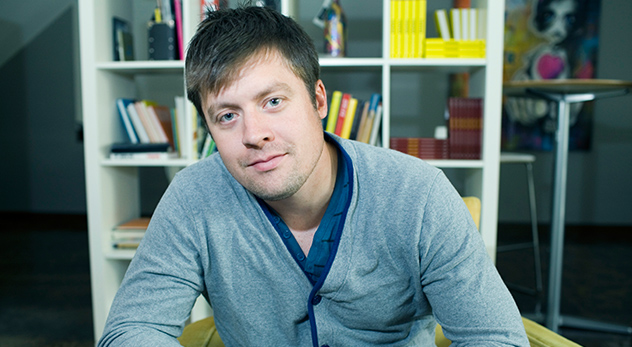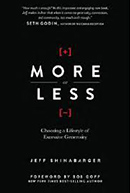
Innovator and author Jeff Shinabarger is leading a conversation on how to live a more generous life – image courtesy of PlywoodPeople.com
At 33 years old, Jeffrey Shinabarger juggles has more concurrent jobs right now than most people cycle through in a lifetime. He is currently a social entrepreneur, experience designer, founder of GiftCardGiver.com, and head of Plywood People, an innovative community addressing social needs through creative projects. So if anyone knows the challenges of work/life balance it’s him. In his first book, More or Less: Choosing a Lifestyle of Excessive Generosity, Shinabarger, turns the myth of work/life balance on its head by sharing practical stories of people who combat personal excess with heartfelt giving. Here we discuss about the motivation behind his work and why a guy with a lot going on needed to add someone else to his plate: sharing a message of generosity.
JM: There’s a well-known adage that says, “Enough is enough.” When was “enough” for you?
JS: One thing I have learned is that drawing the line of enough is a subjective answer. My enough will never be the same as anyone else in the world. Granted, the easiest thing is to critique what others choose to have or not have, but that will not make your life any different. My enough is made up of a series of life experiences that have drawn my line and continue to redraw my line. Hopefully, this question is a continual debate in all of our personal lives and never fully resolved.
The truth is I may want more than I have, but I usually don’t need more. The difference between want and need may result in extreme excess or deep suffering. Rockefeller was asked one time, “What is enough?” and his answer was “A little bit more.” Enough for me means that I am choosing everyday to be more generous with what I have been given and less selfish with my own desires.
JM: What do you hope your readers take away from More or Less?
JS: I hope More or Less is a beginning point to a conversation about generosity. I believe we all want to live a story that is greater than our own personal gain. This starts with asking the question, “What is enough?” It may be one of the hardest questions to ask, but when you wrestle with the question, I believe your life becomes greater. I am a greater person today because of the generosity of others. I am also a greater person because I have been generous to others. I hope readers try a personal social experiment to challenge what is enough in some aspect of their lives. I hope this book inspires more generosity.
JM: Do you feel your counter-cultural message is going to be hard-to-swallow or liberating?
JS: Generosity creates freedom. When you choose less, so others may have more, we all win.
Every experiment in this book is not an example of me being an expert. It is an example that I have way more than I need. Is it hard to change? Yes. Do I have a perfect life today? No. Do I struggle still with wanting more? Every day. This doesn’t make life easier or more convenient. But, it makes our lives more open to community and to the needs of others. When we give, we always gain.
JM: You ask, “What would happen if we created a culture in which we gave away whatever was more than enough for us? How would our habits change if we shed the excess of money, clutter, and food in our lives?” What does that look like for an individual on a practical level,?
JS: The book is full of examples; there are actually 50 practical stories. Half come from my wife and I, and the other come from the community that we help foster through Plywood People. One simple example is adding a bin in your house for excess. These are things that are in your house that you just don’t use, put them in the bin and give them to Goodwill or some other thrift location that can create jobs and opportunities for others. We try to continually get rid of the excess in our house. When we get something new, get rid of other things at the same time. Remember: More does not always equal better.
JM: What would you say to someone who’s facing payroll tax hikes and increasing financial insecurity? How does this message apply to the average working Jane or Joe?
JS: Generosity doesn’t always mean money. There actually isn’t any chapter about giving money in the book. Choosing a lifestyle of generosity means finding what you do have in excess and share that with people that could really benefit from it. If you have a house, are you hosting people in it? If you have time, how are you volunteering your expertise? If you have more clothes than you need, have you given any away lately? We try to create actionable projects in this book that retrain your mind about what you have been given. Generosity is much more than money, it’s a lifestyle of love.
JM: What challenges do social media and the related time suck expose us to?
JS: One thing I have learned is that being busy is not a good thing. Being busy has become a standardized answer to overcome loneliness, insecurities and a lack of clear purpose in life. We are all busy, but doing what? Meanwhile, our business leads to struggling marriages, kids not getting undivided attention, and friends never fully engaging in conversation. Social media only amplifies our ability to be busy. I am not saying any of this because I am pointing a finger at others, I am saying this because I have failed in this area of my own life. I have a hard time shutting down work when I get home. I have a hard time not looking at Instagram when I am with my kids. I have a hard time slowing down and truly digging into the lives of my friends. I need to operate a life that is different that the norm. And the video we created (with my friend Russell Shaw) is a constant reminder to live a life that is generous with time toward people that truly matter in my life. Slowing down and focusing on the person in front of me always creates a deeper connection.






